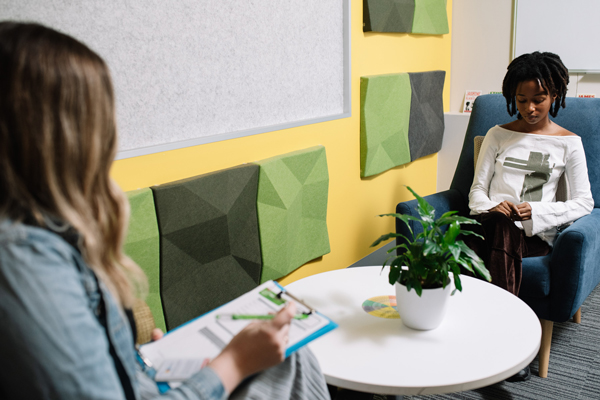Understanding the waiting period for services
Being on a waitlist can be tough and bring up lots of emotions. You might feel anxious, hopeless or annoyed. And these are normal responses. Always remember though, the wait doesn’t mean your needs aren’t important.
We know that waiting, even for a short time, can be tough. While it’s not ideal, some people use that time to reflect and get ready for the journey ahead.
Now let’s look at why the wait might happen -
- More help seekers than helpers: It’s great that more people know about mental health now. This means many more are asking for support when they need it. But sometimes there aren’t enough available appointments/mental health workers to go around right away.
- Getting it right for you: It’s important to find the right kind of support that fits what you’re going through. So services often spend time understanding people’s individual needs and situations.
From more people wanting support to making sure you get the best-matched care, there are various reasons for the delays. But remember, every step, even being on the waitlist, is a move towards better mental health.
The wait time can feel long, but you’re not alone in this. There are things you can do to help you cope, skills you can learn along the way, and places to turn to get support.
Keep reading to explore our tips...
Check out self-help resources
There’s a stack of resources you can access now.
Checking out different resources can help you understand your feelings and learn new skills for tough times. But there’s a lot of info out there, and not all of it’s good. So always go for resources from trustworthy places.
For example:
- You can read helpful articles from organisations like Kids Helpline, headspace, or ReachOUT.
- Try out some useful tools and apps like Smiling Mind (to keep you calm and grounded), Worry Time or The BRAVE Program (to help manage anxiety and stress), Beyond Now (for suicide safety planning), or WellMob, for online resources made for and by First Nations people. For more options, check out ReachOUT’s Tools and Apps.
- Learn skills with headspace’s interactive activities to help you support your mental health and wellbeing and build your skills—from self-acceptance to coping with break-ups, these interactive activities have you covered.
Try these 7 tips to help improve your mental health and wellbeing
There are lots of everyday things you can do to help look after your mental health and wellbeing.
- Stay active: Helps improve sleep, manage stress, and boost your mood. Getting into nature while you stay active is a great idea
- Get into life: Helps maintain the fun in life and can give you a sense of accomplishment
- Catch up with family, friends, and community: Helps you stay connected to people that matter to you and strengthens your support system
- Cut back on alcohol and other drugs: Helps improve sleep and mood
- Get enough sleep: Helps your brain and body rest and recover
- Eat well: Helps your mood, energy levels, and overall health and wellbeing
- Strengthen your coping strategies: Helps prepare you for life’s twists and turns.
We know that some days it can feel hard to do these tips, at times like this, take a small step and see where it takes you. Often starting is the hardest part!
headspace also has resources for First Nations young people and multicultural young people for you to check out.
A word on family
When it comes to supporting young people, we believe that family and other caregivers – whether by birth, choice or circumstance - can play a big role. Studies show that when family is involved in someone’s care, it can really help. So, remember to reach out to trusted family, friends and community for support.
Practise self-compassion
We all go through times in our lives where things get tough - during these times it’s important to be kind to ourselves. Don’t forget to practise self-compassion. It can help us cope with challenges, build our confidence and improve our mental health. Try out our interactive activity on self-compassion.
Join a support group
Connecting with others who are going through similar things can help provide comfort, understanding and a sense of belonging. It can also give us a space to share and build on our coping strategies.
There are lots of support groups both online and in-person for a range of topics including mental health disorders, addiction and other life challenges. There are also many different community support groups including LGBTQIA+ groups such as Qlife or BLAQ, for First Nations peoples.
You can check out headspace’s safe and supportive online communities. These are a great way to connect with others.
- professionally led online community chats by trained clinicians
- peer group chats with other young people going through similar things, moderated by trained peer support moderators
You can also chat to your nearest headspace centre to learn more about groups being offered. Some have life skills or community groups.
Explore online counselling
If you want to speak to a mental health professional while you’re waiting, there are online counselling options available. These are anonymous and free of charge.
- Kids Helpline - for 24/7 phone and online chat for young people aged 5-25 years — call 1800 55 1800.
- eheadspace - chat with mental health professionals over the phone or webchat, seven days a week between 9am – 1am (AEST). It’s a safe space if you want some advice, are unsure of what help you need or just want to talk things through.
For immediate help, please contact emergency services – 000
Sign up for a headspace account
Creating a headspace account lets you build a self-help toolkit within a supportive online community. You’ll find tools and resources for your mental health and wellbeing, connect with like-minded people, join group chats, and get professional 1-on-1 support. And best of all, it's available online and free of charge.
Get some work and study support
If you’re having a tough time, getting into, or staying in, work and study might seem overwhelming, but it can be really good for us. It can boost our confidence, give us a sense of achievement and connect us with others. It’s about building a routine, setting goals and working to achieve them. If you need a hand with it all, check out headspace Work & Study to find out more.
Frequently asked questions
The wait for counselling can vary. Waiting periods can change based on things like where you live and the number of people seeking support. Sometimes, it's quick and other times, there might be a bit of a wait. Check in with the person or the service, they might be able to give you a rough estimate.
Starting counselling is a big step, and the wait can bring up various emotions including anxiety and frustration. It's OK to feel this way, many people have similar feelings before and during their first session.
Of course. While you wait, it's a good idea to support yourself. You could dive into self-help tools, join local groups, stay connected to your GP, or try out online chats. It’s about finding things that work for you.
What should I do if I start to feel worse or the waiting period becomes overwhelming?
Your wellbeing is really important. If you’re having a tough time, or your symptoms or situation are getting worse, it’s super important to tell someone. You could: -
Contact the service
Contact the mental health service or the person you're going to see. They might be able to offer you an earlier appointment, direct you to other resources, or give you some support in the meantime.
Talk to someone
Talking things out or yarning to someone can help you feel supported and heard. You could speak with trusted family, friends, a teacher or an Elder.
It can sometimes be hard letting others know what’s going on, especially if you’re worried about being judged. However, talking to others can help us feel understood and more connected. You could begin by talking about what you feel comfortable sharing, you might just want to say you’re having a tough time.
If you’re experiencing severe distress, have thoughts of self harm or suicide, or are in immediate danger, it’s important to get professional help straight away.
For immediate help, please contact emergency services – 000
National 24/7 crisis services
- Lifeline: 13 43 57 (13 HELP) or lifeline.org.au
- Suicide Call Back Service: 1300 659 467 or suicidecallbackservice.org.au
- Beyond Blue: 1300 224 636 or beyondblue.org.au
- 13 Yarn: Crisis support for First Nations people
Additional youth support services
- ReachOUT
- Kids Helpline or 1800 55 1800
- headspace - for support with your mental health and wellbeing, find your nearest headspace centre or access online and telephone support via eheadspace.
Remember, getting help is a sign of courage. You've taken the first step, and support is on its way. Stay connected, look after yourself and keep going – you're not alone on this journey.
Other useful resources
- Tips for a healthy headspace
- What are mental health difficulties?
- The mental health benefits of work and study mental health benefits of work & study
- Understanding depression
- Understanding anxiety
The headspace Content Reference Group oversee and approve clinical resources made available on this website.
Last reviewed 14 November 2023
Get professional support
If you feel you need help there are a range of ways we can support you.


